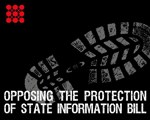This comes after the ANC used its parliamentary majority (with two lone abstentions) to pass the bill in Parliament last November against wide-ranging opposition from civil society, the media and opposition political parties.
If you've lost the plot on this long-running saga, here's the beef:
Even though the ANC softened a few clauses, the bill will give the government the power to jail whistle-blowers and journalists for revealing classified information. What's missing - and what those opposed to the bill are demanding - is the inclusion of a public-interest defence clause (at the very least!) to protect whistle-blowers and others if they act in the public interest. (Here's an excellent, clear article on the M&G's website detailing 'http://amabhungane.co.za/article/2012-02-22-whats-still-wrong-with-the-secrecy-bill What's still wrong with the Secrecy Bill'.)
So what's going on this week:
Eighteen individuals and organisations have been selected to make oral submissions to the NCOP but many are questioning why only the South African National Editors' Forum (SANEF) and Media Monitoring Africa, an NGO that monitors journalism for the advancement of human-rights issues, have been selected to represent the media's many-textured views on the bill. (Here's the list of oral submissions, in the order in which they will appear, of those selected to present.)
Those struck from the list, for instance, include former editor-in-chief of The Star Harvey Tyson; Prof Jane Duncan (@DuncanJane), chair of Highway Africa at Rhodes University, and industry body Print Media SA.
The oral submissions were chosen from 259 written submissions, of which only one - which was also penned anonymously - supported the bill.
So where does the Secrecy Bill come from?
It was first issued in March 2008 by the Intelligence Ministry under Ronnie Kasrils and there was an immediate outcry that it was too draconian. Kasrils sent the bill to the ministerial review commission on intelligence comprising Joe Matthews, Dr Frene Ginwala and Laurie Nathan. The aim of the review was to "strengthen mechanisms of control of the civilian intelligence structures in order to ensure full compliance and alignment with the Constitution, constitutional principles and the rule of law, and particularly to minimise the potential for illegal conduct and abuse of power".
The commission came back a few months later with recommendations: chiefly that the bill be rewritten so that, among other things, the broadly defined idea of national interest be scrapped and that only the intelligence minister have the right to classify categories of information - subject to comment by Parliament and interested parties.
Then, in July 2010, the bill reached the portfolio committee hearings stage in Parliament and everyone realised that not only had the recommendations of the commission been ignored but that various "softening" factors contained in the original bill had been removed and certain parts had been made harsher, for example, penalties for revealing classified information.
Opposition started mounting - including from COSATU, ANC stalwarts Kasrils (replaced by Siyabonga Cwele as state security minister) and the late Kader Asmal and the head of the Anglican church in Southern Africa, Archibishop Thabo Makgoba.
The ANC did then soften a few clauses but it does not seem to be prepared to budge on the public-interest defence clause. When Cwele briefed NCOP committee members on the contents of the bill in January, he dismissed calls for a public-interest defence as a "minor issue".
COSATU, meanwhile, appears to have recently softened its opposition to the bill and, according to this story by the M&G, is divided on its stance.
Nevertheless, opposition parties - from the DA to the IFP and COPE - have gotten together to fight the bill and they and many others say they will challenge it in the Constitutional Court if it is passed into law. (Here are the various parties positions on the bill in speeches given at a recent meeting: the DA, IFP and COPE),
Where to from now?
The NCOP - the upper house of our parliament - is not the end of the road. Should the NCOP fail to order a public-interest clause be introduced, the bill can still be sent back to Parliament by President Jacob Zuma.
The signs, however, are that this is unlikely but it is very clear that this controversial piece of law will be challenged in the Constitutional Court - and it's very hard to see how it will stand up to the right to freedom of speech and expression.
What can you do?
Keep following it in the news, turn out for the protests, tweet about it (Secrecy Bill, POSIB and POIB hashtags seem to be the most popular), talk about it to friends and colleagues and write about it - it's our constitutional right to do so!
For more:











































